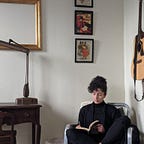Part 6: El Ingeniero con Alma de Poeta
Maracaibo
Maracaibo was rumored to be the coldest city in Venezuela because air conditioning blasted in every establishment. My parents purchased an apartment lacking wooden bay windows but drenched in the sunlight reflecting off Lake Maracaibo in the horizon. Each week, my father drove to the family ranch in Machiques, spending his evenings playing dominos under the moonlight as Tio Gernán strummed a worn down Spanish guitar.
My father’s companion during his weekly roadtrips was a red, Ford pickup with a gun locked away in the glove compartment and cassette player that rotated between rancheras, tangos and boleros. My favorite song as a child had been “Caballo Blanco” by Vicente Fernández, although later I chose to play “Cien Años” by Pedro Infante as my father neared the end of his life.
Despite the frequent moves characterizing my father’s life trajectory, music served as the constant thread. He filled a wooden chest to the brim with cassettes and amassed over 3,000 records organized according to region and then genre.
Over the years, we spent many afternoons of listening to records as he stood before his easel, producing breathtaking work in a matter of hours. By the time we arrived in the United States, I was already thinking of the day I would listen to his records alone, but Maracaibo kept these worries at bay through its everlasting, raucous joy.
During our time in Maracaibo, my father teared up at my every ballet recital and encouraged me to take up piano lessons on alternating afternoons.
I discovered a strange comfort in reciting memorized lines before hundreds of parents during our school’s theater productions, filling him with pride as his daughter emulated his capacity to hold a room’s attention with the cadence of her voice.
The year we announced our departure to the United States, my ballet instructor, Nedo, awarded me a solo act in the academy’s yearly performance. Nedo and Sasha Vojkick had met while dancing professional ballet in Yugoslavia and opened a classical ballet school in Maracaibo shortly after their arrival. My feet throbbed after weeks of rehearsing a routine before Nedo’s perfectionism, yet my efforts were validated as I spotted the tears framing the faces of my parents from on stage.
Whether it was pride that fueled their tears or a looming grief over losing Venezuela, taking a bow that evening is my last memory of our life before immigrating.
